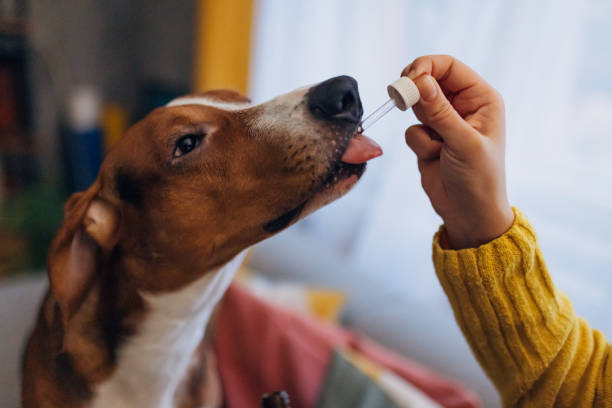Should Senior Dogs Take Supplements? The Ultimate Guide to Supporting Your Aging Pet
Do senior dogs need supplements?
With so many to choose from it can be hard to know what’s best for your aging pup. Let’s get into what your senior dog really needs.
As your dog's age, their nutritional needs change. Whether they’re dealing with joint pain, cognitive decline or a weakened immune system, a senior dog supplement can help their overall health.
In this post, we’ll discuss the benefits, what to look for in a senior dog supplement, and how to decide if they’re right for your pet.
Disclaimer: This article is intended for informational purposes only and does not constitute medical advice. Always consult your veterinarian for diagnosis and treatment of any health concerns regarding your pet.
Introduction

As your dog gets older you may be wondering, "Do senior dogs need supplements?"
With so many products on the market claiming to improve everything from joint health to cognitive function, it can be hard to know what’s really necessary.
In this post, we’ll discuss the benefits, risks, and how to decide if supplements are right for your aging pet.
Caring for your senior dog means understanding their changing needs. Supplements can be helpful but they’re not a magic pill, whether it's dietary supplements or supplements that support healthy skin or a pill that promotes healthy joints for your furry senior.
Let’s get into when and how supplements can help your dog’s health and longevity.
Signs of Aging in Senior Dogs
As your dog ages their body goes through many changes that can impact their quality of life.

Here are some common signs of aging in senior dogs:
- Decreased Mobility: Joint stiffness, arthritis, or general slowing down during walks or playtime can be common in older dogs.
- Weight Gain or Loss: Metabolism changes can cause weight fluctuations which can lead to other health issues.
- Cognitive Decline: Older dogs can become confused, anxious or less responsive to commands showing signs of canine cognitive dysfunction.
Knowing these changes can help you better support your senior dog’s health and it may be time to consider supplements.
Why Supplements Might Be Necessary

Supplements are often recommended for senior dogs to support their changing bodies.
Not every senior dog may need them, but they can help with specific health issues related to aging such as joint pain or a weakened immune system.
- Joint Support: Senior dog joint supplements can help with pain and stiffness caused by arthritis so your dog can stay active. By adding a supplement into your dog's diet, you may see some increased results for healthy joints.
- Immune Boost: As dogs age their immune system weakens making senior dogs more prone to infections. Supplements can support immune function.
- Cognitive Function: Just like humans, dogs can suffer from cognitive decline as they age. Certain supplements can help brain health.
Not all senior dog supplements are created equal so it’s important to know which ones are right for your dog’s specific needs. It's also true that not all dog supplements are pur-fect for your furry seniors, as some of them may not absorb nutrients as they need.
As always, consult your vet to assess what is the best option for your older dog.
Types of Supplements for Senior Dogs
Below are the lists of supplements you can give to your beloved furry senior for their golden years!

Joint Health Supplements
One of the most common reasons to give supplements for senior dogs is joint health. As dogs age their joints can become stiff and painful, especially in larger breeds that are prone to arthritis. Some helpful active ingredients to search for include:
- Glucosamine and Chondroitin: These two work together to reduce inflammation and support cartilage repair in the joints.
- MSM (Methylsulfonylmethane): Found in many joint supplements MSM can reduce pain and improve mobility.
- Green-Lipped Mussels: This stuff is a rich source of omega-3s and anti-inflammatory compounds. Green Lipped Mussels help reduce inflammation and support cartilage health by giving your dog the nutrients they need. The omega-3s in Green Lipped Mussels are especially good at reducing joint stiffness so your senior dog can move comfortably.
- Turmeric/Curcumin: Turmeric is famous for its anti-inflammatory and antioxidant properties and helps with pain and inflammation in aging joints. Turmeric also supports overall immune function so it’s a great addition to your senior dog’s supplement routine.
- Boswellia Serrata Extract: A natural herb that reduces inflammation, Boswellia Serrata helps joint function and stiffness. It’s been shown to improve mobility and comfort in dogs with arthritis so it’s a great ingredient for flexibility and comfort in senior dogs.
For dogs with mobility issues, joint supplements can make a big difference in their comfort and activity levels.
Omega-3 Fatty Acids for Skin and Coat
Omega-3 fatty acids found in fish oil supplements can help with your dog’s skin and coat.
- Reduces Inflammation: Omega-3s are anti-inflammatory and can help with itchy or dry skin.
- Supports Heart Health: Omega-3s support heart health which is important for aging dogs prone to heart disease.
A shiny coat and healthy skin is a sign of a balanced diet and omega-3s can help with that.
Probiotics for Digestive Health
Senior dogs often experience digestive issues like diarrhea or constipation which can be helped by probiotics.
- Balances Gut Flora: Probiotics support healthy gut bacteria, digestion, and overall gut health.
- Supports Immune System: A healthy gut is essential for a strong immune system, especially in older dogs.
Probiotics are a simple and effective way to keep your senior dog’s digestive system healthy.
Antioxidants for Cognitive Function
Antioxidants are important to protect your dog’s cells from damage, especially in the brain. Senior dogs can suffer from cognitive decline and antioxidants can help slow that process.
- Vitamins E and C: These vitamins are powerful antioxidants that can protect the brain from oxidative stress.
- S-Adenosylmethionine (SAMe): Used to support cognitive function in aging dogs SAMe can improve alertness and mental clarity.
Cognitive supplements won’t reverse cognitive decline but they can slow it down and help your dog stay sharp longer.
Multivitamins for Overall Health
A high-quality multivitamin for senior dogs can fill in the nutritional gaps that occur from a less-than-perfect diet.
- Balanced Nutrition: Multivitamins provide a broad range of essential vitamins and minerals to support your dog’s overall health.
- Boosts Energy: Some senior dogs can lack energy and a multivitamin can give them the extra support they need to stay active.
Multivitamins are especially helpful for dogs that aren’t getting all they need from food alone.
How to Choose the Right Senior Dog Supplements

Choosing the right supplement for your senior dog depends on their individual needs. Here are a few things to consider:
- Talk to Your Vet: Always consult with your veterinarian before adding any new supplement to ensure it’s safe and necessary for your dog.
- Quality Ingredients: Look for supplements with natural ingredients. Avoid products with fillers or artificial additives.
- Specific Health Needs: Tailor the supplement to your dog’s specific health issues, joint pain, cognitive decline, skin issues, etc.
Choosing the right product will ensure your dog gets the benefits without the risks.
Are There Any Risks Involved in Giving Senior Dog Supplements?

While supplements can be really good for senior dogs, there are risks to be aware of. One of the biggest is allergies, especially to common protein sources like chicken which is often found in many supplements. If your dog has known food allergies or sensitivities you’ll want to check ingredient labels carefully to avoid any allergens that could trigger a reaction. In some cases, fillers or flavorings in supplements can also cause an allergic response.
Also, some dogs may experience digestive upset when starting new supplements. Introduce them slowly and monitor your dog for any signs of discomfort or side effects like vomiting, diarrhea, or changes in behavior. Always consult your vet before adding supplements to your senior dog’s routine especially if your dog has allergies or is on medication.
- Allergies: Chicken, beef or dairy may be in supplements.
- Digestive Upset: Sudden introduction of new ingredients can cause stomach upset or diarrhea.
- Interactions with Medication: Some supplements may interact with prescribed medication so vet approval is key.
Natural vs. Commercial Senior Dog Supplements: What’s Better?

Some pet owners prefer natural supplements like fresh fish for omega-3s or turmeric for inflammation. Others go for commercial supplements specifically designed for senior dogs. Both have their advantages.
- Natural Supplements: These can provide a whole food source of nutrients but it can be hard to ensure your dog gets the right dose.
- Commercial Supplements: These are formulated to deliver the right amount of nutrients and are often tested for safety and efficacy.
It’s up to you and your dog’s health needs. Always consult with your vet for advice.
When to Start Your Senior Dog on Supplements

Deciding when to start supplements can be tough. In general, it’s a good idea to start when you see signs of aging but not before your dog shows symptoms.
- Early Signs of Aging: If you see stiffness, slow movement, or cognitive decline it may be time to consider supplements.
- Proactive Approach: Some pet owners start joint supplements or omega-3s before any issues arise as a preventative measure.
Starting early will help manage symptoms before they become severe.
How to Give Senior Dog Supplements

Giving supplements to your senior dog doesn’t have to be a chore. Many supplements come in forms that dogs love.
- Chewable Tablets or Soft Chews: These can be given as treats so you can just add them to their daily routine.
- Liquid Supplements: These can be mixed into food or given with a dropper for picky eaters.
- Powdered Supplements: Sprinkle the supplement powder on top of their food to mix it in.
The right form makes supplement time easy for both you and your dog.
Other Ways to Support Your Senior Dog’s Health
Supplements are just one part of the equation when it comes to keeping your senior dog healthy.

Here are a few other ways to keep your dog in top shape:
- Diet: A balanced senior-specific diet is key to your dog’s health. Choose food for older dogs with the right protein and fat levels.
- Exercise: Keeping your senior dog active is important for muscle mass and joint health. Gentle walks and low-impact play will keep them mobile.
- Regular Vet Visits: Frequent vet visits are key to catching any age-related issues early. Your vet can also recommend supplements or changes to your dog’s care routine.
Conclusion
Supplements can be a powerful tool to support your senior dog’s health, addressing issues like joint pain, cognitive decline, and digestive problems.

But they aren’t necessary for every dog. The decision to use supplements should be based on your dog’s specific health concerns with guidance from your vet. With the right supplements, you may see improvements in your dog’s mobility, energy, and overall quality of life.
Remember supplements are just one part of the equation when it comes to senior dog care. A balanced diet, regular exercise, and regular vet visits are just as important to keep your older dog healthy and happy.
By paying attention to your dog’s needs and working with your vet you can give your senior dog the best life possible.
FAQs
1. Can I give my senior dog human supplements?
No, human supplements may contain ingredients that are toxic to dogs. Always choose products for pets.
2. How long does it take to see results?
Depends on the supplement and your dog’s condition but you may see improvement in a few weeks.
3. Do I need supplements if my dog is on a senior diet?
Senior dog food is designed to meet most of your dog’s needs but supplements can support specific health issues.
4. Can supplements replace my senior dog’s medication?
Supplements are not a replacement for medication prescribed by your vet but they can work alongside.
5. What are the side effects?
Some dogs may experience stomach upset or allergic reactions. Introduce slowly and consult your vet.




